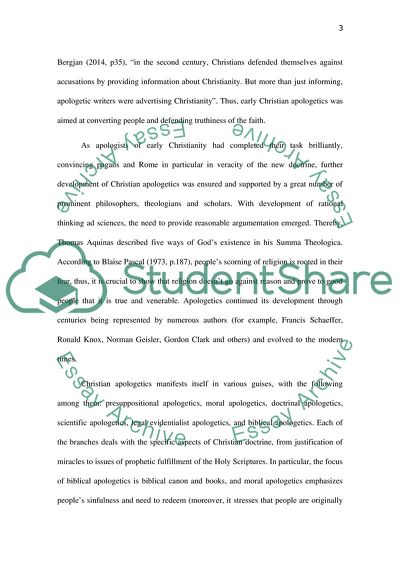Cite this document
(Apologetics and Anselms Ontological Argument Essay Example | Topics and Well Written Essays - 2750 words, n.d.)
Apologetics and Anselms Ontological Argument Essay Example | Topics and Well Written Essays - 2750 words. https://studentshare.org/religion-and-theology/1856877-critically-analyse-anselms-ontological-argument-for-the-existence-of-god-identifying-its-strengths-and-weaknesses-module-outcomes-to-be-met-outcomes-1-2-and-3-outcome-1-explain-the-history-of-apologetics-and-its-place-in-a-postmoder
Apologetics and Anselms Ontological Argument Essay Example | Topics and Well Written Essays - 2750 words. https://studentshare.org/religion-and-theology/1856877-critically-analyse-anselms-ontological-argument-for-the-existence-of-god-identifying-its-strengths-and-weaknesses-module-outcomes-to-be-met-outcomes-1-2-and-3-outcome-1-explain-the-history-of-apologetics-and-its-place-in-a-postmoder
(Apologetics and Anselms Ontological Argument Essay Example | Topics and Well Written Essays - 2750 Words)
Apologetics and Anselms Ontological Argument Essay Example | Topics and Well Written Essays - 2750 Words. https://studentshare.org/religion-and-theology/1856877-critically-analyse-anselms-ontological-argument-for-the-existence-of-god-identifying-its-strengths-and-weaknesses-module-outcomes-to-be-met-outcomes-1-2-and-3-outcome-1-explain-the-history-of-apologetics-and-its-place-in-a-postmoder.
Apologetics and Anselms Ontological Argument Essay Example | Topics and Well Written Essays - 2750 Words. https://studentshare.org/religion-and-theology/1856877-critically-analyse-anselms-ontological-argument-for-the-existence-of-god-identifying-its-strengths-and-weaknesses-module-outcomes-to-be-met-outcomes-1-2-and-3-outcome-1-explain-the-history-of-apologetics-and-its-place-in-a-postmoder.
“Apologetics and Anselms Ontological Argument Essay Example | Topics and Well Written Essays - 2750 Words”. https://studentshare.org/religion-and-theology/1856877-critically-analyse-anselms-ontological-argument-for-the-existence-of-god-identifying-its-strengths-and-weaknesses-module-outcomes-to-be-met-outcomes-1-2-and-3-outcome-1-explain-the-history-of-apologetics-and-its-place-in-a-postmoder.


